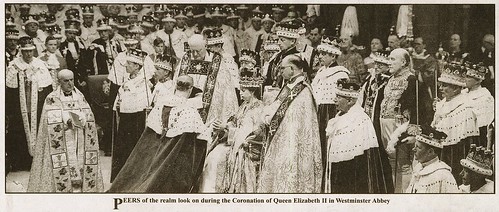Written by Katie Shepherd
As the RESP continue to add to their collection of oral history archival material, Ailsa and I were commissioned as fieldwork interns to conduct interviews with a community group based at the John Gray Centre in Haddington. Our internship project intended to record a series of interviews with the ambition of producing a publication based on the audio recordings content.
The last six months has been a whirlwind of interviews, writing, editing, and of course, lots of meetings over tea and coffee. As the internship draws to a close, I thought it would be a good time to reflect on the goals we have surpassed since November 2024 and the processes involved in an oral ethnography project.
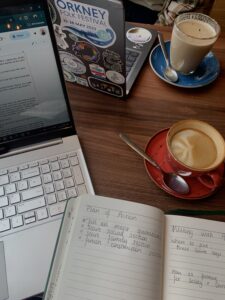
One of many meetings over coffee!
Ailsa and I developed a skeleton plan for the publication but were encouraged be flexible in our approach, so the interviewees felt able to discuss their own interests. With this guidance, we decided to theme the interviews around ‘working life’ – a broad topic that allowed participants to speak about their careers and industries, social lives in and out of work, alternative streams of income and even unpaid labour.
Having been prompted to consider possible outputs for the recording content, Ailsa and I decided on creating a publication similar to Jumpers for Goalposts – the publication created by the group in 2016 – in its structure but also to create some digital content to increase accessibility and awareness of the project. This hybrid approach has proved successful so far, as the publication gives the group members a tangible product of their interviews, and their relationships, but the digital products are engaging to a wider audience through social media, web pages and in person presentations.
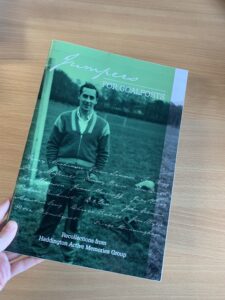
Jumpers for Goalposts, the groups first publication (2017).
After an initial few weeks of planning in the office at the Centre for Research Collections, Ailsa and I’s first meeting with the group occurred at their Christmas party which involved a competitive quiz and plenty of refreshments. This informal introduction set the tone for what was to be an extremely fruitful series of interviews that are vernacular and informative, and at times emotional and poignant as memories left untouched for years are rekindled.
January involved a fieldwork training session from the EERC’s senior research fellow Mark Mulhern, prepping us for the following weeks of interviews. Between late January and early March Ailsa and I interviewed 12 group members – with some assistance from Caroline Milligan and Ruth Fyfe, who interviewed group members who reside in a local care home – mostly at the John Gray Centre in Haddington, although one or two took place on university grounds. Alternating roles as sound technician/active listener and interviewer, Ailsa and I efficiently curated over 14 hours of interview recordings.

Vikkie, Dick, Ailsa and Katie (left to right) looking at some photographs provided by Vikkie and Dick.
Much of March was absorbed by the task of reviewing interviews, taking notes and transcribing passages for potential use in the publication, and organising this information on a thematic basis. Inputting interview quotations and time stamps into a spreadsheet accelerated this process and although it was an – unexpectedly – intensive task, it deepened our understanding of the groups individual and collective histories and allowed us to more accurately represent their spoken testimonies in prose.
Pic of spreadsheet/planning (no GDPR breaches :D)
In due course, Ailsa and I began to write the main body of the publication by splitting the book into seven chapters: Careers and Industries, Politics, International Interactions, Sporting Life, Social Life and Festivities, Family, and Reflections on Change and Continuity. Entrusted by the group members to interpret their oral reflections into the written word was an honour, and a responsibility that I took seriously. I enjoy this part of the internship immensely; watching the group’s memories unfold and intertwine in the book as it was written was enthralling.
During this time, I led team liaisons with internal and external colleagues from RESP, East Lothian Council and an independent designer commissioned to create the publication. As the group had already been involved in the publication Jumpers for Goalposts, we wanted All in a Day’s Work to feel like another instalment in the same series, thus we worked with the same designer and used a similar design. Ailsa also got to work on creating a short film with snippets of the interviews to showcase some excerpts spoken by the group themselves – you can watch that here.
The editorial process was another rigorous stage; one that I undertook with enthusiasm powered by a desire to acquire copy-editing and proofreading skills. After completing a first draft, Caroline and Lesley reviewed the content and suggested edits on a hard copy. I then implemented the majority of these edits into the digital copy, further tweaking, correcting and re-writing as I went. Issues of style and consistency are inevitable in a co-authored book, and by compiling a style sheet with all discrepancies, I worked through this with Caroline to ensure the book read in a cohesive and accessible manner. The nature of oral ethnography requires a specific ‘editing voice’ to balance the readers comprehension while staying as close to the spoken word as possible.
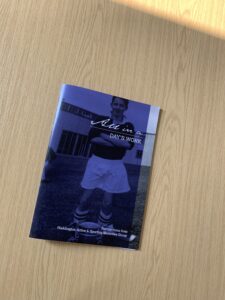
A sneak-preview of All in a Day’s Work!
At the time of writing (28th of May 2025), All in a Day’s Work, the fruits of this rapid, fantastic internship, is due to be launched next week. The publication will first be presented to the Haddington Active Memories and Sporting Memories Groups at their meeting on the 3rd of June, and then to staff at the Centre for Research Collections later that afternoon.
Watch official RESP channels for digital copies of the book and more!






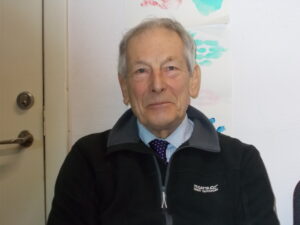

 fieldworker, Janis Macdonald
fieldworker, Janis Macdonald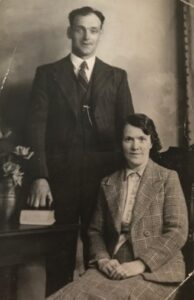 my grandparents, William and Helen Cunningham
my grandparents, William and Helen Cunningham